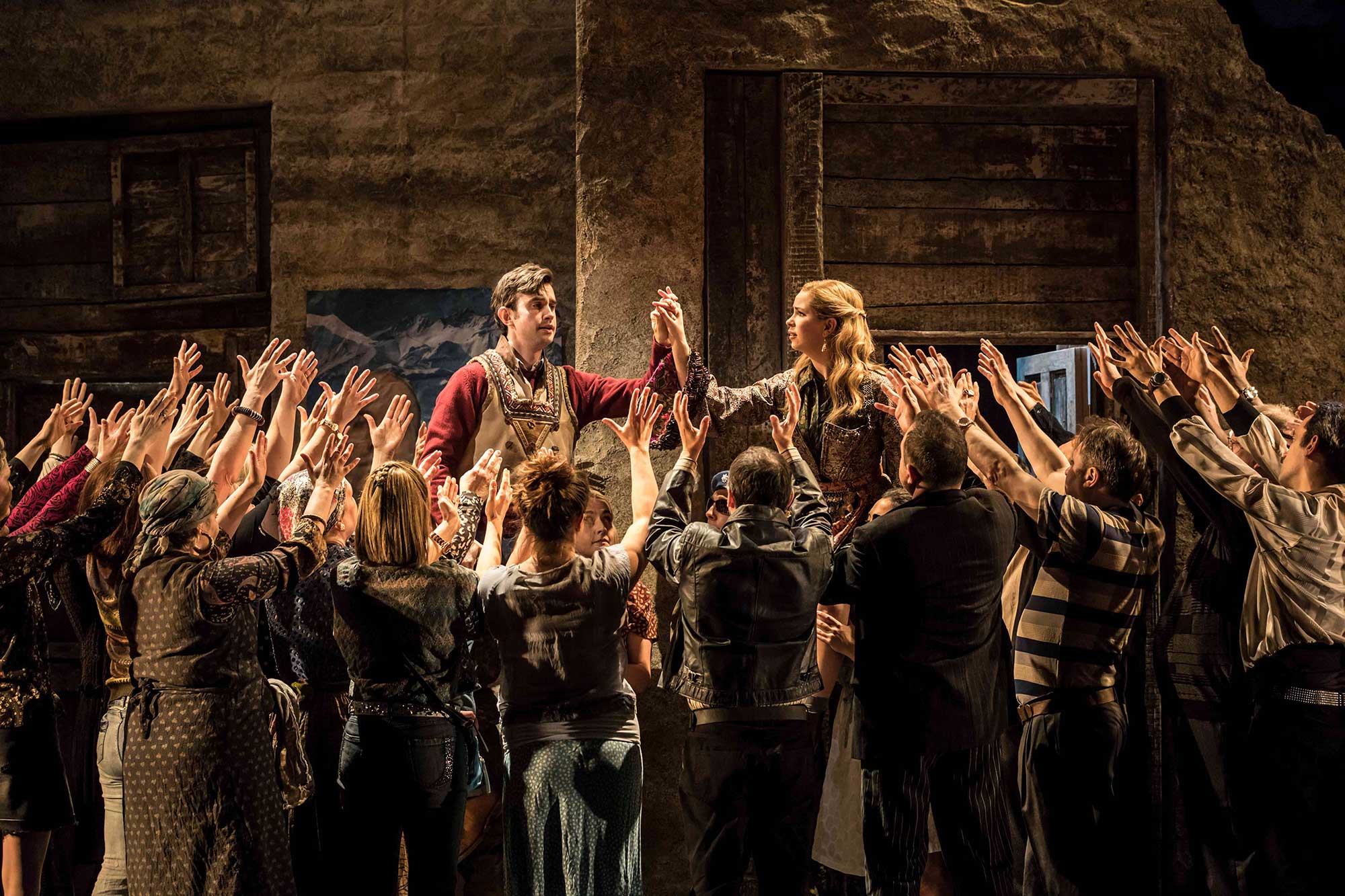ENO Baylis Play the Critic
28th March 2017 in News
Play the Critic, run in collaboration with Mousetrap Theatre Projects aims to support students to develop critical thinking skills and hone their review writing under the guidance of professional opera critics. The students, many of whom have never experienced opera before, had the opportunity to attend two ENO productions at the London Coliseum, take part in a masterclass on review writing and benefit from individual feedback from critics before publishing their reviews. Read this year’s winning reviews here.
Rigoletto
Review by Ellen from Woodford County High School
The curtains close four times during ENO’s Rigoletto, but the tension doesn’t stop rising until the final scene races to its tragic end.
From the get-go, the audience is thrust into the smoky bars and back-alleys of Mafia-era Italy, a world of danger and underhand conversation, where Rigoletto, a joker in the pay of the womanizing Duke, must protect his daughter from the corruption of the outside world. Jonathan Miller’s twice-revived production pierces the tenderest moments with irony, such as the heartbreaking duets between Rigoletto and Gilda (Nicholas Pallesen and Sydney Mancasola); a father’s attempts to shield his daughter only result in her pining for freedom.
You have probably already heard the most famous aria of the piece, ‘La donna e mobile’, sung in this production as ‘Women abandon us’, by lyric tenor Joshua Guerrero, whose performance is convincingly seductive, although the lack of a really ‘evil’ antagonist is a little frustrating.
The other candidate for villain is Barnaby Rea’s brilliant Sparafucile, an assassin who offers his services should Rigoletto feel the need to quietly bump someone off. This dark character, not surprisingly, fit so very well into the Godfather-esque setting, that he appeared to be just a man doing his job, if a sinister one that gets him frequently termed ‘the devil’.
Much of the story is told via the confining staging: Gilda is a caged songbird; the lounging chorus hustle into tight gang-circles, and yet the open street scenes do not bring any respite. Instead, they encourage fear of what might be behind the next corner, underlining the tragedy of no real escape, Rigoletto unable to get out of his mind that ‘the old man cursed me’.
And yet the production feels escapist; it is impossible to look away once we are drawn into this morbid world. The constant undercurrent of suspense pays such homage to Verdi’s soaring score, that you’ll wonder if any other setting could do the music as much justice.

The Winter’s Tale
Review by Arrije Mohamed from William Morris Sixth Form
The crowd pulling and ascetically pleasing stage was impressive to both the audience and the actors. I have only ever been to two operas in my entire life and I can confidently say this was the best experience that just pulled me in and makes me want to visit the opera every week; perhaps even sleep there so I could never miss a show.
The Winter’s Tale honestly left me speechless, I was riddled for words, from the actors, to the staging, to the orchestra and the designers. Everything was perfect; I found myself gripping my jumper every now and then and just smiling into blank air because I was genuinely excited for what was going to happen next. [I would insert a video of me being happy but that would be a tad bit biased and to be honest with you nobody wants to see my cheesy smile, I’d ruin the performance!].
Another point that exhilarated me and made my blood pressure levels rise was the lighting and effect, I was just astounded by how amazing and awe-inspiring everything was. The main scene that I must say stood out to me was when the little boy had come to being an angel and the smoke and light followed and he really did look like he was in heaven. Lost for words is all I can say, I’d honestly want my wedding to look like that. Just how everything seemed to tie in together and the lyrics with the effects and sounds and lighting just seemed to match together like peanut butter and jelly … or inseparable twins.
I was quite pleased with the naturalist setting; although expressionist at times I do prefer it over a minimalistic setting where your brain has to imagine a setting for you. The staging was just beautiful and what you would imagine, as a matter of fact I wouldn’t mind re- decorating my house with big extravagant statues and lovely pillars with marble and stone walls. I must say if I had a dream house it would for sure resemble The Winter Tales staging.
I can truly state that I have never written a critical review about anything in my entire life and started this a little worried since I have no idea what I’m doing but I did think it was all about criticising what you have just reviewed; hence the word ‘critic’ … but it’s almost impossible to critic something that was almost the definition of perfect. I do say almost the definition of perfect because there was one thing that seemed to bother me in the second interval of the play and it was a curtain in the back drop that had been left a little open, and with a short attention span like mine I couldn’t help but stare until it vanished. But nevertheless with or without the interrupting curtain moving and letting in unnecessary light, it was still perfect and I wouldn’t have changed a thing.
I hope you enjoyed my review, it came straight from my heart with no planning prior and this has truly wanted me to go and see more operas’ or anything to do with theatres; thank you for the lovely experience.

